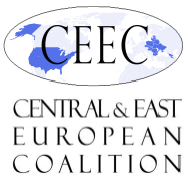 5/1/2016- AHF participates in drafting Central and East European Coalition Spring 2016 Policy Paper. The 2016 brief addresses Ukraine; NATO and Security in Central and Eastern Europe; the Visa Waiver Program and Immigration Reform; Energy Security; Democracy, Human and Minority Rights, the Rule of Law, and the Information War; US Assistance to and Promotion of Regional Democratic Governance; Trade and Economic Integration; Trade and Economic Integration; Energy; and Black Ribbon Day. 5/1/2016- AHF participates in drafting Central and East European Coalition Spring 2016 Policy Paper. The 2016 brief addresses Ukraine; NATO and Security in Central and Eastern Europe; the Visa Waiver Program and Immigration Reform; Energy Security; Democracy, Human and Minority Rights, the Rule of Law, and the Information War; US Assistance to and Promotion of Regional Democratic Governance; Trade and Economic Integration; Trade and Economic Integration; Energy; and Black Ribbon Day.
SPRING 2016 CEEC POLICY PAPER [download]
CONTENTS:
- UKRAINE [1]
- NATO AND SECURITY IN CENTRAL AND EASTERN EUROPE [2]
- VISA WAIVER PROGRAM AND IMMIGRATION REFORM [3]
- DEMOCRACY, HUMAN RIGHTS, THE RULE OF LAW, AND THE
INFORMATION WAR [4]
- U.S. ASSISTANCE TO AND PROMOTION OF REGIONAL DEMOCRATIC GOVERNANCE [5]
- TRADE AND ECONOMIC INTEGRATION [5]
- ENERGY [6]
- BLACK RIBBON DAY [7]
UKRAINE
The riveting Revolution of Dignity in Ukraine’s central Maidan during the brutal winter of 2013-2014 demonstrated a people’s desire to define their nation's political identity and their determination to integrate into Euro-Atlantic institutions.
In the context of the geo-strategic interests of the United States, the current war against Ukraine has far-reaching consequences for the world's security. Russian President Putin’s declared objective to establish a “Russkiy Mir" (Russian World) has resulted in the violation of international borders, the seizure and illegal occupation of Ukraine’s territory, the illegal annexation of Crimea, and a continuing war waged by Russian troops and their proxies.
This war, started by Russian clandestine operatives, is entering its third year. According to UN reports, over 1.7 million Ukrainian citizens have been displaced because of the war, while another 9,000 have been killed. It is rightly viewed with alarm by the United States and our NATO allies. The invasion of Ukraine and the forcible annexation of sovereign Ukrainian territory have de-stabilized the transatlantic security framework that emerged since the fall of the Soviet Union.
Ukraine's inclusion into Euro-Atlantic structures clearly serves U.S. national interests. The security of the United States lies in the expansion of democracy, not in the appeasement of aggressor states making imperial claims. Furthermore, the United States, with the United Kingdom and Russia, publicly affirmed in the Trilateral Agreement in 1994 (known as the Budapest Memorandum) to guarantee Ukraine's independence, sovereignty and territorial integrity. In exchange, Ukraine renounced its nuclear weapons and acceded to the Non-Proliferation Treaty (NPT) as a non-nuclear state.
The crisis in Eastern Europe, and in Ukraine specifically, will not just go away. In an informationally interconnected and economically interdependent world, the United States must take the lead in promoting
international norms and consolidating geo-political stability.

ACTION NEEDED
- Cosponsor S. 2692, Countering Information Warfare Act of 2016, introduced by Sen. Rob Portman (ROH) and Sen. Chris Murphy (D-CT). The bill authorizes the creation of a Center for Information Analysis and Response, which would lead and coordinate the collection and analysis of information on foreign government information warfare efforts, including information provided by recipients of information access fund grants awarded under subsection (e) and other source.
- Cosponsor H.R. 5181, Countering Foreign Propaganda and Disinformation Act of 2016, introduced by Rep. Adam Kinzinger (R-IL) and Rep. Ted Lieu (D-CA). This bill is a companion bill to S. 2692.
- Cosponsor legislation to provide military assistance to Ukraine, including
- H.R. 955, introduced by Rep. Adam Smith (D-WA), to authorize assistance to the military and national security forces of Ukraine;
- H.R. 93, the "Crimea Annexation Non-recognition Act," which prohibits the United States from recognizing the de jure or de facto annexation of Crimea by the Russian Federation, introduced by Rep. Gerald Connolly (D-VA).
- Cosponsor H.R. 5094, Stability and Democracy (STAND) for Ukraine, introduced by Rep. Eliot L. Engel (D-NY) and Rep. Adam Kinzinger (R-IL). The bill clarifies the position of the United States on Russia’s illegal occupation of Crimea, tightens sanctions on Russia, and drives new innovations to provide support for Ukraine.
- Strengthen sanctions as necessary to achieve compliance with cease-fire agreements and withdrawal of covert and overt Russian forces and equipment from Ukraine, as set forth in S. 1356, the National Defense Authorization Act.
- Demand that the President provide Ukraine with defensive equipment, services, and training in order to counter offensive weapons and reestablish its sovereignty and territorial integrity, as authorized per
H.R. 5859, enacted on December 18, 2014.
NATO AND SECURITY IN CENTRAL AND EASTERN EUROPE
The CEEC welcomes the administration’s plans to increase funding for the region through the European Reassurance Initiative (ERI) and to preposition military equipment in Eastern Europe. The CEEC believes it is time to establish permanent NATO bases in the Alliance’s eastern member states, since any objection has been removed by Russia’s war on Ukraine. The CEEC supports both increased NATO and U.S. bi-lateral military assistance to Ukraine and Georgia to achieve peace and security, as well as stability on NATO’s eastern flank.
In the face of Russia’s aggressive actions NATO must respond by strengthening its collective defense and supporting regional partners – including Ukraine, Georgia, and other CEE countries. In 2008, Russian troops forcibly occupied the Georgian territories of Abkhazia and South Ossetia, keeping heavy military presence in close proximity to the strategic East-West transportation corridor. In 2014, the Russian Federation forcibly annexed Crimea, and is attempting to take over parts of eastern Ukraine. Proactive U.S. leadership is vital to NATO’s continued effectiveness, to protect peace and security in Europe. Russia’s war on Ukraine and continued escalation of armed conflict threatens both Ukraine’s independence and the welfare of tens of millions of
Europeans. A strong, coordinated military force is essential to stop Russia as it continues to destabilize its neighbors and disrespect international rules.
Russia’s intimidation of the Baltic countries must cease. These intimidation tactics include: the incursion into Baltic airspace by military aircraft, large scale military exercises adjacent to Estonia, Latvia, Lithuania and Poland, a simulated nuclear attack against Warsaw, as well as disruption of sea traffic by unscheduled naval exercises within the Baltic countries’ sea zone. Without strong military support, treaties and cease-fire agreements will continue to be breached.
The CEEC advocated for the successful enlargement of NATO over the past two decades, and continues to urge the U.S. Congress to support NATO membership for qualified countries. The passage of legislation to extend membership to Ukraine, Georgia and other qualified CEE countries is vital to defend sovereign integrity, secure peace and democracy.
The CEEC urges the United States to review its current planned missile defense system, and re-align it to more effectively protect all NATO member states, allies and partners. The CEEC also supports the efforts of the United States, bilaterally and through NATO, to protect cyber infrastructure from disruption and aggression. This includes establishing effective counter-measures against cyber attacks, cyber crime and cyber espionage.
Finally, the CEEC calls for continued U.S. leadership and engagement in support of the Organization for Security and Cooperation in Europe (OSCE) Minsk Group process. We urge a peaceful and just resolution to the Nagorno Karabakh conflict.

ACTION NEEDED
- Cosponsor H.Res. 660, supporting territorial integrity of Georgia.
- Support NATO membership for aspiring CEE countries.
- Support increased spending for NATO operations through the U.S. Dept. of Defense appropriations bill.
- Establish permanent NATO bases in Poland and the Baltic countries to provide increased training and weaponry.
VISA WAIVER PROGRAM AND IMMIGRATION REFORM
The CEEC believes that it is in the best interest of the United States to have the Visa Waiver Program (VWP) expanded, especially to countries that have demonstrated a capacity and willingness to cooperate with the United States in achieving counter-terrorism goals.
The VWP pilot allowed six EU countries from CEE (the Czech Republic, Slovakia, Hungary, Latvia, Lithuania, and Estonia) to join the VWP in 2008. However, for those not admitted during the pilot, such as Poland and others, an automatic reinstatement of the standard eligibility rules occurred in June 2009. These rules include requiring the aspiring country to have less than a 3 percent visa refusal rate in order to be eligible for participation in the Program (as opposed to 10 percent that was set in the pilot). These rules have had the unfortunate effect for millions of CEE Americans, mostly of Polish descent, that their relatives still cannot travel freely to the United States.
The CEEC also supports fair and equitable immigration laws, which include a pathway to citizenship, as well as the establishment of a new P visa category to cover groups and individuals coming to the United States for cultural/educational purposes at the invitation of a U.S.-based group with ethnic ties to the invitee’s country. This new category includes those coming to present and/or teach ethnic or folk culture, music, theater, dance, or other artistic endeavors of the country of origin.

ACTION NEEDED
- Cosponsor H.R. 1401, Jobs Originated through Launching Travel Act of 2015, introduced by Rep. Joseph Heck (R-NV), and other legislation that would modify the VWP to allow further expansion to include the most dependable U.S. allies, such as Poland.
- Support reform of immigration laws that offer a pathway to citizenship.
DEMOCRACY, HUMAN RIGHTS, T
HE RULE OF LAW, AND THE INFORMATION WAR
The CEEC supports democracy and its indispensable elements: the rule of law, human rights, minority rights, freedom of the press and historical accuracy, all of which are especially important in the CEE region, considering its history, previous Soviet domination, and ethnic, national, and religious diversity. While democracies have emerged and developed in CEE since the collapse of communism, issues remain to be resolved. An autocratic regime still reigns in Belarus. Vestiges of intolerance and discrimination against national minorities linger even within some countries that have joined Euro-Atlantic institutions. Denial of crimes against humanity, including the Armenian and Ukrainian Genocides of 1915 and 1932-33, respectively, undermines the pillars of democracy. Other threats to democracy include a lack of separation of powers, a less than independent judiciary, as well as corruption. Such conditions enable Russia to pursue its aggressive policies by penetrating and influencing both the public and private sectors, including military preparedness.

ACTION NEEDED
- Cosponsor H.R. 624, the Global Magnitsky Human Rights Accountability Act, introduced by Rep. Christopher H. Smith (R-NJ).
- Ensure that Magnitsky Act sanctions against the Putin regime are fully implemented. The United States should closely monitor human rights and corruption issues in the Russian Federation as required by the Magnitsky Act.
- Cosponsor legislation to ensure that U.S. international broadcasting and social media efforts effectively counter Russian disinformation, and support freedom of the press, including:
- S. 2517, Combat Terrorist Use of Social Media Act, introduced by Sen. Ron Johnson (R-WI)
- .Res. 152, reaffirming freedom of the press as a priority, introduced by Sen. Robert P. Casey, Jr. (D-PA)
- H.R. 2242, World Press Freedom Protection Act, introduced by Rep. Christopher H. Smith (R-NJ)
- H.R. 2323, United States International Communications Reform Act of 2015, introduced by Rep. Edward R. Royce (R-CA)
- Cosponsor H. Res. 154, introduced by Rep. Robert J. Dold (R-IL), calling on the President to work toward equitable, constructive, stable, and durable Armenian-Turkish relations based upon the Republic of Turkey's full acknowledgment of the facts and ongoing consequences of the Armenian Genocide, and a fair, just, and comprehensive international resolution of this crime against humanity.
The Russian government uses many avenues in its attempts to dominate the countries of the CEE region. Putin’s ongoing war in Ukraine is just one example. Others include economic manipulation (e.g., blocking energy transit, trade barriers, and cyber attacks), accusations of discrimination against people of Russian descent living in CEE countries, as well as disinformation and propaganda.
Russia sees the aspirations of neighboring CEE countries toward integration with the EU as a threat against its interests. As a reaction, it has threatened economic consequences should aspiring countries advance EU Association Agreements and has pressured them to join an alternative Russian-dominated Eurasian Customs Union. U.S. foreign policy, countering Russia’s attempts to reestablish a “sphere of influence” in the region, should emphasize the promotion of democratic principles and institutions. The CEEC urges the United States to condemn Russia’s blatant intimidation and attempts to undermine the independence of countries in the region. U.S. policies towards Russia in this regard should be pursued in a forceful and proactive manner.
The CEEC strongly supported the Magnitsky Act. In the spirit of that law, its provisions need to be fully implemented and expanded to include sanctions against other human rights violators in the Russian Federation. While Putin’s crimes against Ukraine are growing, Moscow's increasing crackdown against its own citizens is also troubling. Until human rights are respected by Russia, both outside of and within its borders, it is critical that the United States continue to help expose violations by the Russian Federation, and to defend internationally recognized human rights and freedoms.
Russian revision of history denies or excuses Stalin-era atrocities and actions, such as the Holodomor (Famine-Genocide) in Ukraine, Soviet occupation of CEE countries, and murder and deportation of millions of CEE nationals.
Russia’s propaganda distorts and falsifies both current events and history. It is a powerful tool used to discredit and attack perceived adversaries. Democracy in Russia is deteriorating, as demonstrated by the repression of NGOs, election fraud and rampant corruption. The United States needs to lend its moral voice against human rights abuses. The United States must counter Putin via the airwaves, to expose Moscow’s lies and present our values via competent and fully-funded U.S. international broadcasting. The CEEC supports important reforms to address the Broadcasting Board of Governors’ management structure, clarify the mission of our international broadcasters, and empower our journalists.
U.S. ASSISTANCE TO AND PROMOTION OF
REGIONAL DEMOCRATIC GOVERNANCE
While many countries within CEE have “graduated” from U.S. assistance programs under the SEED and FREEDOM Support Acts, U.S. funding should remain a priority for Armenia, Georgia, and Ukraine. Security assistance programs to the region, such as Foreign Military Financing (FMF) and International Military Education and Training (IMET), should be enhanced. Also, funds should continue to be devoted to promoting democracy in Belarus. Furthermore, financial and other support for governmental and non-governmental programs directed towards anti-corruption efforts and development of civil society in the region are critical.
Exchange programs, a part of public diplomacy, are an acknowledged and successful means of promoting international understanding, good will, and training to citizens of the United States and participating countries, and need to be continued.

ACTION NEEDED
- Join the Congressional Caucus on Central and East Europe.
- Enhance FMF and IMET funding levels for CEE countries.
- Support robust funding for the countries of Armenia, Georgia, and Ukraine, and continued assistance to promote democracy in Belarus.
- Maintain funding for educational and cultural exchange programs.
TRADE AND ECONOMIC INTEGRATION
An essential component to achieving and maintaining well-functioning democracies in CEE is having healthy and growing economies. The CEEC favors policies and reforms that encourage the continued integration of CEE countries into Western institutional structures, thus supporting their economic development. The CEEC supports expansion of opportunities to realize the benefits of economic growth, through increased trade, and market economic systems based on the rule of law, appropriate regulation, transparency, and ethical business practices.

ACTION NEEDED
- Cosponsor S. 1725, introduced by Sen. Lindsey Graham (R-SC) and H.Res. 73, introduced by Rep. Rodney P. Frelinghuysen (R-NJ), recognizing the importance of trade to the U.S. economy and the importance of free trade agreements with Pacific Rim countries and the European Union.
- Cosponsor S. 995, S. 2130, H.R. 1890, and H.R. 2772 to support market economic systems based on the rule of law.
- Monitor Transatlantic Trade and Investment Partnership (TTIP) negotiations to ensure that the agreement mutually benefits the United States and the countries of the CEE region.
Currently, a number of CEE countries are in various stages of pursuing increased economic integration with Western institutions, particularly through adoption of Association Agreements (AA) and Deep and Comprehensive Free Trade Agreements (DCFTA) with the EU. The CEEC opposes Russia's pressure on countries to defect from the AA process and instead, move toward integration with a Russia-dominated customs union. The CEEC strongly favors the continued integration of CEE countries into Western institutions, and believes that the active support of U.S. foreign and defense policy is crucial to success of the integration process.
A number of CEE countries that are well integrated into EU institutions are striving to improve their economic performance, provide better employment opportunities, and adjust to the challenges of a dynamic, competitive world economy. The CEEC supports the negotiations of the proposed TTIP agreement. The agreement aims to expand the already robust economic relationship between the United States and the EU, through further reduction of tariffs, and better coordination of regulatory regimes, which will support trade-in-services and encourage a robust investment climate, technological innovation and entrepreneurship. The CEEC seeks to ensure that the agreement benefits both the United States and all of the countries of the CEE region.
ENERGY
Energy security, safety and clean technology are vital to the energy-deficient CEE region. Currently, Russia is the primary source of gas and oil supplies, which it uses to attain its political and economic objectives. This is evident with abrupt cut-offs of gas and oil, price escalations to selected EU countries, and redirection and/or reductions of gas supplies to Europe, such as disrupted natural gas supplies to Ukraine in June 2014.
U.S. policies could assure a secure and safe source of energy to the CEE countries. First, U.S. policy should facilitate the timely process of the export of U.S. liquefied natural gas (LNG) supplies to NATO countries, and other countries that promote U.S. national security interests. Secondly, it is essential that U.S. policy support interconnection of electrical and gas resources with their western EU counterparts to improve efficient utilization of energy supplies. Third, U.S. policies must provide certainty for investment and technology in order to diversify energy supplies and support efficient utilization of resources in the CEE region.

ACTION NEEDED
- Actively support policies that provide transparency and certainty concerning the export of LNG, including: S. 33, S. 1237, and S. 1247.
- Cosponsor H.R. 287, American Job Creation and Strategic Alliances LNG Act, Rep. Michael R. Turner (R-OH) (Application and approval process for export to WTO countries).
- Cosponsor H.R. 89, the Domestic Prosperity and Global Freedom Act, Rep. Jim Bridenstine (R-OK) (LNG Export destinations and approvals).
- Cosponsor H.R. 1175 Clean Energy Technology Manufacturing and Export Assistance Act of 2015, Rep. Doris O. Matsui (D-CA).
Legislation should support the timely procedures for the export of U.S. LNG, thereby loosening Russia’s monopoly of energy supplies and their use for political manipulation throughout Europe. LNG exports will lead to the establishment of global gas markets with non-discriminatory pricing, thus making it difficult for Russia to dictate pricing based on geopolitics. A global LNG market would promote transparency in pricing and invigorate investments and economic developments.
The CEEC is also concerned about the operations and accident hazards posed by a nuclear power plant being constructed in Belarus just across from Lithuania’s border and just 30 miles away from Lithuania’s capital Vilnius with a population of about 700,000. The United States should actively advocate for full compliance of any new nuclear power plant with internationally established safety standards and monitoring while such plants are constructed.
BLACK RIBBON DAY
The CEEC supports the establishment of a national August 23 Black Ribbon Day, to honor and commemorate those who lost their lives, were tortured, deported, lost their property or otherwise suffered under the ravages of the Soviet communist and Nazi regimes. These repressions touched many Americans of CEE extraction, being directly affected themselves, or having relatives and friends who suffered. The infamous Molotov-Ribbentrop Pact was signed on August 23, 1939, dividing Europe between the Soviet and Nazi regimes. National Black Ribbon Day is already officially observed by EU members, Canada, and Georgia.

ACTION NEEDED
- Re-introduce legislation or request an Executive Order designating August 23rd as Black Ribbon Day.
[< Back to CEEC news]
[< Back to all AHF news] |
[< Back to CEEC news]
Related News

U.S. Reverses Decades of Oil-Export
Limits With Obama's Backing: U.S. Reverses DecaWith the stroke of a pen, President Barack Obama on Friday ended 40 years of U.S. crude oil export limits by signing off on a repeal passed by Congress
[read more]
About the CEEC
The Central and East European Coalition (CEEC) is comprised of 18 national organizations, including the American Hungarian Federation (AHF), whose members trace their heritage to Central and Eastern Europe. The CEEC raises issues of common concern to its diverse membersip, such as NATO's enlargement, energy security and visa waiver.

CEEC member organizations:
American Hungarian Federation
American Latvian Association
Armenian Assembly of America
Belarusan-American Association
Bulgarian Institute for Research and Analysis
Congress of Romanian Americans
Washington Chapter, Czechoslovak
National Council of America
Estonian American National Council
Georgian Association in the USA
Hungarian American Coalition
Joint Baltic American National Committee
Lithuanian American Council
Lithuanian American Community
Polish American Congress
Slovak League of America
Ukrainian Congress Committee of America
Ukrainian National Association
[read more about the CEEC]
CEEC Policy Briefs
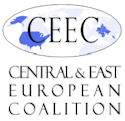 11/25/2013 - FALL 2013: AHF participates in drafting Central and East European Coalition (CEEC) Fall 2013 Policy Paper. It includes language on minority rights: "...support the equitable and prompt restitution of properties – including private, communal, and church properties – that had been illegally confiscated by governments of CEE, from ethnic minorities and the populations at large." [read more] 11/25/2013 - FALL 2013: AHF participates in drafting Central and East European Coalition (CEEC) Fall 2013 Policy Paper. It includes language on minority rights: "...support the equitable and prompt restitution of properties – including private, communal, and church properties – that had been illegally confiscated by governments of CEE, from ethnic minorities and the populations at large." [read more]
 5/29/2012 - AHF participates in drafting CEEC Policy Brief on minority rights and NATO expansion and issues multiple action alerts including: Supporting S. 2177, the NATO Enhancement Act, introduced by Sen. Richard Lugar to encourage
further enlargement of NATO and to deepen U.S. strategic partnerships with NATO allies. [read more] 5/29/2012 - AHF participates in drafting CEEC Policy Brief on minority rights and NATO expansion and issues multiple action alerts including: Supporting S. 2177, the NATO Enhancement Act, introduced by Sen. Richard Lugar to encourage
further enlargement of NATO and to deepen U.S. strategic partnerships with NATO allies. [read more]
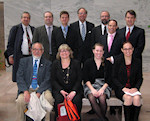 4/13/2011 - American Hungarian Federation drafts Central and East European Coalition 2011 Policy Brief, helps organize Advocacy Day on Capitol Hill.., In its continuous effort to raise issues important to the Hungarian American community, the American Hungarian Federation (AHF) participated in an April 13 Advocacy Day organized by the Central and East European Coalition (CEEC). The Advocacy Day involved meetings with key staffers in both the Senate and House of Representatives in the U.S. Congress. [read more] 4/13/2011 - American Hungarian Federation drafts Central and East European Coalition 2011 Policy Brief, helps organize Advocacy Day on Capitol Hill.., In its continuous effort to raise issues important to the Hungarian American community, the American Hungarian Federation (AHF) participated in an April 13 Advocacy Day organized by the Central and East European Coalition (CEEC). The Advocacy Day involved meetings with key staffers in both the Senate and House of Representatives in the U.S. Congress. [read more]
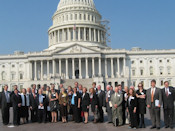 9/23/2010 - AHF helps plan CEEC Advocacy Day in US Congress, drafts 2010 Policy Brief addressing Democracy and Human and Minority rights. 9/23/2010 - AHF helps plan CEEC Advocacy Day in US Congress, drafts 2010 Policy Brief addressing Democracy and Human and Minority rights.
[read more]
Related CEEC Articles
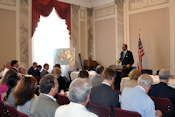 8/3/2011 -- The American Hungarian Federation and the Central and East European Coalition participate in a reception and Capitol Hill Policy Seminar entitled, "20 years: Three Perspectives on the Evolution of U.S. Strategic Engagement with Central and Eastern Europe." [read more] 8/3/2011 -- The American Hungarian Federation and the Central and East European Coalition participate in a reception and Capitol Hill Policy Seminar entitled, "20 years: Three Perspectives on the Evolution of U.S. Strategic Engagement with Central and Eastern Europe." [read more]
 4/13/2011 - American Hungarian Federation Participates in Central and East European Coalition Advocacy Day on Capitol Hill... CEEC issues 2011 Policy Brief [read more] 4/13/2011 - American Hungarian Federation Participates in Central and East European Coalition Advocacy Day on Capitol Hill... CEEC issues 2011 Policy Brief [read more]
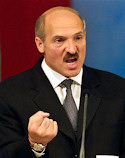 01/24/11 - CEEC and AHF Submit Letter to Secretary Clinton expressing deep concern over "brutal post-election crackdown by Lukashenka's (Lukashenko) regime on peaceful demonstrators, democratic activists, journalists and civil society" in Belarus. [read more] 01/24/11 - CEEC and AHF Submit Letter to Secretary Clinton expressing deep concern over "brutal post-election crackdown by Lukashenka's (Lukashenko) regime on peaceful demonstrators, democratic activists, journalists and civil society" in Belarus. [read more]
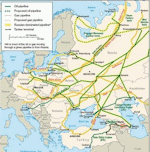 7/5/2010 - AHF participates in Capitol Hill policy seminar on energy security, "Coercion in the European Energy Sector: Implications for the United States." The seminar was held on June 24, 2010 and sponsored by the Central and East European Coalition (CEEC) in cooperation with the Congressional Caucus on Central and Eastern Europe. [read more] 7/5/2010 - AHF participates in Capitol Hill policy seminar on energy security, "Coercion in the European Energy Sector: Implications for the United States." The seminar was held on June 24, 2010 and sponsored by the Central and East European Coalition (CEEC) in cooperation with the Congressional Caucus on Central and Eastern Europe. [read more]
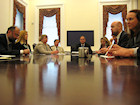 4/25/2009 - The American Hungarian Federation
Participates in White House Meeting... On April 24, 2009, the Central and East European Coalition (CEEC) met with Jeffrey M. Hovenier, Director for Central and Eastern Europe, National Security Council, and Katherine M. Helgerson, Director for Southeast European Affairs, National Security Council. 4/25/2009 - The American Hungarian Federation
Participates in White House Meeting... On April 24, 2009, the Central and East European Coalition (CEEC) met with Jeffrey M. Hovenier, Director for Central and Eastern Europe, National Security Council, and Katherine M. Helgerson, Director for Southeast European Affairs, National Security Council.
[read more]
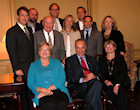 7/25/2008 - American Hungarian Federation Participates in CEEC Meeting with Senator Schumer: Discusses Russia "Hegemony" statement... The purpose of the meeting was to seek clarification of statements contained in Senator Schumer’s June 3rd Wall Street Journal article that were susceptible to the interpretation that he condoned Russian designs on Central and Eastern Europe. [read more] 7/25/2008 - American Hungarian Federation Participates in CEEC Meeting with Senator Schumer: Discusses Russia "Hegemony" statement... The purpose of the meeting was to seek clarification of statements contained in Senator Schumer’s June 3rd Wall Street Journal article that were susceptible to the interpretation that he condoned Russian designs on Central and Eastern Europe. [read more]
 6/19/2008 - American Hungarian Federation Helps Plan and Participates in Successful CEEC Congressional Policy Discussion on Central and Eastern Europe. [read more] 6/19/2008 - American Hungarian Federation Helps Plan and Participates in Successful CEEC Congressional Policy Discussion on Central and Eastern Europe. [read more]
 3/5/2008 - American Hungarian Federation Participates in Meetings With Senator Obama’s and Senator Clinton’s Foreign Policy Advisors... A number of policy issues were discussed with former Secretary of State Madeleine Albright and other top officials. [read more] 3/5/2008 - American Hungarian Federation Participates in Meetings With Senator Obama’s and Senator Clinton’s Foreign Policy Advisors... A number of policy issues were discussed with former Secretary of State Madeleine Albright and other top officials. [read more]
 3/3/2008 - American Hungarian Federation Raises Issue of Vojvodina Hungarians With Senator Senator Clinton’s Foreign Policy Advisor, Ron Asmus... The meeting touched upon numerous issues of concern to the member organizations of the CEEC. [read more] 3/3/2008 - American Hungarian Federation Raises Issue of Vojvodina Hungarians With Senator Senator Clinton’s Foreign Policy Advisor, Ron Asmus... The meeting touched upon numerous issues of concern to the member organizations of the CEEC. [read more]
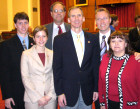 3/29/2006
- The American Hungarian Federation helps organize congressional
reception with the Central East European Coalition (CEEC). The
reception's main focus was concerns over political developments in Belarus,
the former Soviet Republic, and Russia`s support for the policies of President
Alexander Lukashenko. The opposition says President Lukashenko, who has
led Belarus for more than a decade, has become increasingly authoritarian,
suppressing free speech and jailing democratic dissenters. [download
CEEC member Iryna Vidanava's speech] 3/29/2006
- The American Hungarian Federation helps organize congressional
reception with the Central East European Coalition (CEEC). The
reception's main focus was concerns over political developments in Belarus,
the former Soviet Republic, and Russia`s support for the policies of President
Alexander Lukashenko. The opposition says President Lukashenko, who has
led Belarus for more than a decade, has become increasingly authoritarian,
suppressing free speech and jailing democratic dissenters. [download
CEEC member Iryna Vidanava's speech]
 3/16/2006
- The American Hungarian Federation participates in protest
over anti-democratic developments in Belarus. In a show of solidarity
with fellow CEEC members, demonstrators gathered in front of the Belarusian
Embassy in Washington, DC on March 16 to protest against the authoritarian
regime of Alexander Lukashenko, and to offer support for the people of
that country. 3/16/2006
- The American Hungarian Federation participates in protest
over anti-democratic developments in Belarus. In a show of solidarity
with fellow CEEC members, demonstrators gathered in front of the Belarusian
Embassy in Washington, DC on March 16 to protest against the authoritarian
regime of Alexander Lukashenko, and to offer support for the people of
that country.
Additional AHF Articles
Articles and Essays by AHF Members
- "NATO Enlargement" by Frank Koszorus Jr. March 29, 2004
Remarks on the Occasion of the Enlargement of NATO, Corcoran Gallery of Art, Washington, D.C. [download]
---
- "Nato Enlargement And Minority Rights: Prerequisites To Security" by Frank Koszorus, Jr., April 2003
A memorandum that was submitted to Robert A. Bradtke, Deputy Assistant Secretary for European and Eurasian Affairs, and Heather A. Conley, Deputy Assistant Secretary for European and Eurasian Affairs during a roundtable discussion on "NATO Enlargement and the Current State of the Trans-Atlantic Alliance." This submission follows several other intiatives, including submissions to Lord Roberston, Secretary General of NATO. [download]
---
- “Nato Enlargement: Promoting Western Values, Strengthening The Alliance” by Frank Koszorus, Jr., April 29, 2003
A Statement Before The United States Senate Committee On Foreign Relations.
[download]
---
- "U.S. Senate Unanimously Ratifies Nato Treaty; Senators Raise Rights Of Minorities: Federation Supports Efforts Aimed At Encouraging Romania And Slovakia To Respect Rights Of Hungarian Minorities And Restore Communal Properties" - Press Release by Zoltan Bagdy, May 9, 2003 [download]
Congressional Resolutions and Records
- H.RES 191 - A RESOLUTION urging the "prompt and fair restitution of church properties by Romania and Slovakia - TOM LANTOS / TOM TANCREDO (April 6th 2005) in the House of Representatives [download]
- A RESOLUTION REGARDING THE ISSUE OF TRANSYLVANIAN HUNGARIANS -- HON. DONALD E. `BUZ' LUKENS (Extension of Remarks - February 26, 1990) in the House of Representatives [download]
- VIOLENCE IN TRANSYLVANIA -- HON. DON RITTER (Extension of Remarks - March 22, 1990) in the House of Representatives [download]
- Transylvanian Monitor #14: Property Restitution.
Join online!

|



